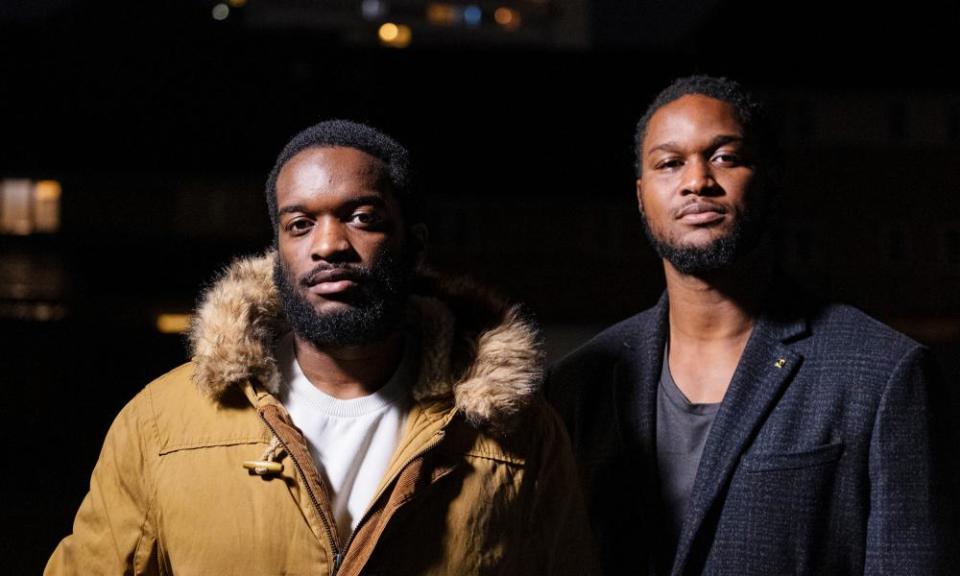Brothers stopped and searched over a fist bump to sue Met police

Two innocent black brothers wrongly suspected by police of drug dealing after they bumped fists in the street say they were targeted because of their skin colour and will sue the police.
Dijon Joseph, 30, and his brother Liam, 29, say they were left humiliated and distressed when they were stopped and searched, with one brother handcuffed.
The brothers from a devout Christian family in south London told the Guardian that between them they have been stopped and searched by police more than 25 times, starting when they were children.
Related: Met police criticised for multiple errors in stop and search practice
They said black people were being treated as suspects by police until proven otherwise, damaging relations with communities, which they were still hopeful could be repaired.
Their case was one of five which the police watchdog cited on Tuesday as they criticised the Met for their use of stop and search, and identified a phalanx of areas needing improvement.
The Joseph brothers were stopped and searched on 27 February 2018 outside a Caribbean takeaway on Deptford high street, south London. At the time Dijon worked in education as a mentor, and Liam is a musician.
Dijon said: “I was ordering food and I stepped outside. I saw my little brother and that is when we fist bumped.
“They surrounded us, physically detained us including by using handcuffs, and searched us in public over a period of about 20 minutes. It was humiliating; we were distressed and confused, but that understandable reaction was described by police as ‘incredibly evasive and aggressive’.”
Dijon, who is 6ft 8in tall, said: “It is so offensive to be called aggressive when you are not being aggressive. My skin colour and hair to a white police officer seems aggressive. I had one hand handcuffed and a phone in the other.”
Related: Stop-and-search use in London rose 40% in lockdown, figures show
Liam said: “The only explanation we have seen is that it was because we fist bumped each other, and because we were in Deptford hgh street at the time. The reality of course of this is that this happened because we are young black men. Our very skin colour is ‘suspicious’, which is why we are nine times more likely to be stopped and searched.”
Dijon says it was about the 20th time he had been stopped and searched by police in London, an ordeal with began at age 12. Liam says he has been stopped six times. Neither has a criminal conviction.
Dijon said: “I have been stopped 20 times, because they are targeting black males. There has never been a just reason.”
Liam added: “You have to swallow your pride and bite your tongue and not say anything.”
Both brothers said the Met is institutionally racist with the disproportionate stops of black people coming from unconscious bias or from overt bias, with most officers not living in London, and not knowing its culture.
Liam said: “This ignorance makes young black people seem like a threat. They stigmatise us, without knowing us.”
The brothers complained to the Independent Office for Police Conduct.
The police watchdog confirmed officers declined to answer key questions and it concluded there was insufficient evidence to uphold any misconduct complaint against the officers, including of discrimination.
A requirement for officers to cooperate with IOPC investigations came in only after this case concluded.
Dijon said the system for holding police to account is too weak: “These officers opted to give ‘no comment’ interviews, and the IOPC said that there was not enough evidence to say it was discrimination. If the complaints system can’t join the dots in an experience like ours then that system also needs to change. This week’s recommendations from the IOPC are only as valuable as the system which enforces them.”
Dijon said he was not “policed by consent”, which is the guiding philosophy of British law enforcement.
The brothers say they are left with no option but to sue, with institutions supposed to uphold justice failing. Liam said: “We approached the Equality & Human Rights Commission for help in bringing a case. They refused. We asked the Commissioner of Police of the Metropolis to admit discrimination under the Equality Act and they too refused. Having exhausted all other options we have today [Thursday] started civil proceedings at court against the Metropolitan police for discrimination, assault and false imprisonment. It remains our hope that the police and all the systems surrounding them will learn from our experience; change is past due.”
Their solicitor Carolynn Gallwey said her firm, Bhatt Murphy which specialises in claims against the police, had never been busier: “My firm is receiving a record number of inquiries about the discriminatory use of stop and search at the moment – proper reform has never been needed more”.
A video of their stop on social media attracted over 200,000 views.
The IOPC confirmed officers declined to answer key questions during oral interviews.
A spokesperson for the watchdog said: “In isolation, this case did not identify misconduct or evidence of racial profiling, however looking at this in conjunction with other investigations has identified broader concerns that there is a lack of understanding from officers about why their actions may be perceived to be discriminatory.
“That is why we have recommended the MPS takes steps to ensure that assumptions, stereotypes and bias (conscious or unconscious) are not informing or affecting their officer’s decision-making on stop and search.”
The Met has denied bias effects stop and search and says the powers help get dangerous weapons off the streets.

 Yahoo News
Yahoo News 